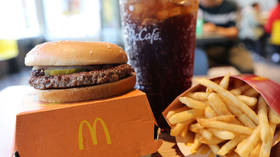McDonald’s burgers blamed for deadly E. coli outbreak

One person in the US has died and at least 49 have become sick after eating McDonald’s Quarter Pounder hamburgers, the Centers for Disease Control and Prevention (CDC) has said. It is unclear which ingredient in the fast food classic is responsible for the illnesses.
The infections were reported between September 27 and October 11 across ten US states, with the majority occurring in Colorado and Nebraska. Those affected range in age from 13 to 88, with the fatal case occurring in “an older adult,” the CDC said in an update on Tuesday.
Ten people have been hospitalized, including one child suffering from hemolytic uremic syndrome, a serious condition that causes damage to blood vessels in the kidneys.
“The true number of sick people in this outbreak is likely much higher than the number reported, and the outbreak may not be limited to the states with known illnesses,” the CDC said in an another update on Wednesday.
All 18 sick people interviewed by public health officials reported eating at McDonald’s in the week before they became ill. Of 14 people who remember which beef hamburger they ate, 12 said they had a Quarter Pounder, a staple of the McDonald’s menu since the 1970s.
The CDC said that it is still unsure which Quarter Pounder ingredient was contaminated, but that the Food and Drug Administration (FDA) suspects slivered onions may be to blame. Meanwhile, the Food Safety and Inspection Service (FSIS) is tracing the beef patties used in the burgers to determine if they were the source of the outbreak.
McDonald’s has temporarily pulled the Quarter Pounder from its menu in affected states and stopped using slivered onions in other burgers. Speaking to the Today show on Wednesday, McDonald’s USA President Joe Erlinger said that the company had taken “swift action,” and that he is “very confident that you can go to McDonald’s and enjoy our classics.”
E. coli is a group of bacteria that normally lives in the gut of people and animals. Some strains of E. coli are harmful, and can cause severe illness, including fever, stomach cramps, diarrhea and vomiting. These strains typically infect humans who unknowingly ingest fecal matter.














